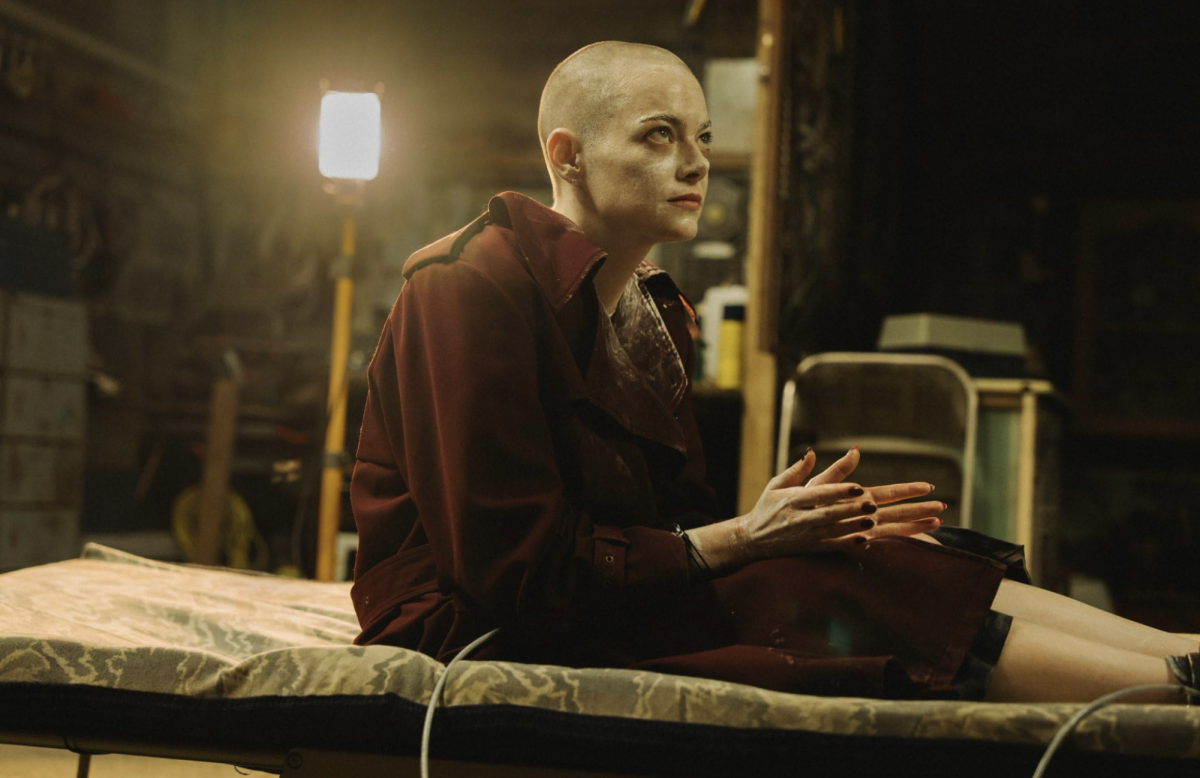
IMDB

Following a recent torrent of films examining how humanity has doomed and damned itself — think “Eddington,” “Superman” and “One Battle After Another” — comes Yorgos Lanthimos’ “Bugonia.” A welcome addition to this lineup, “Bugonia” distinguishes itself from the others by tackling the topic through dialogue-driven intrigue.
A remake of the 2003 South Korean film “Save the Green Planet!,” “Bugonia” centers on cousins Teddy (Jesse Plemons) and Don (Aidan Delbis) who live in a solitary echo chamber of Teddy’s conspiratorial beliefs that Earth is secretly ruled over by Andromedans, an alien species that is biologically corrupting humanity. Teddy’s research has convinced him that Michelle Fuller (Emma Stone), CEO of the monolithic pharmaceutical company for which Teddy works, is one such alien being. So, naturally, the cousins abduct her and take every precautionary measure to protect themselves from the creature’s devious wiles — they chemically castrate themselves, shave her head and slather her with antihistamine cream. Thus commences an increasingly tense series of discussions and negotiations.
In classic Lanthimos style, the plot is infinitely more unhinged than can be adequately described, but the film’s utter absurdity, overarching ambiguity and final twist ultimately make it a resonant, thought-provoking piece. Though the cousins’ introductory dialogue and intimidating low-angle shots of Fuller prime the audience to initially side with Teddy and Don, the film’s increasing madness leaves you wondering whose side you should really be on.
The film neither lauds nor ridicules Teddy, who represents a satirized caricature of the many U.S. citizens that are subject to internet-induced mass psychosis and who fall prey to uninformed and even fantastical conspiracies. Similarly, Fuller, while clearly the victim of the situation, is still portrayed as a cold, almost inhuman millionaire, who has built her wealth by stepping on the backs of poor and working-class people like Teddy and Don. The final twist and poignantly beautiful last sequence make it abundantly clear that the film’s apparent neutrality is actually meant to highlight the validity of both sides’ claims — it is a commentary on humanity that simultaneously condemns these individuals for their actions and acknowledges the reality of the fundamental issues they each argue.
“Bugonia” relies heavily on the characters’ heated exchanges, anchored by incredible performances all around. In what is now her fourth feature film working with Lanthimos, Stone delivers a captivating performance as the commanding and unwaveringly resolute Fuller. The tension between her and Teddy is searing, with Stone’s brilliance matched by Plemons’ embodiment of Teddy’s complex unpredictability and occasional chilling human sympathy. Delbis offers a fantastic supporting performance, and the almost brotherly love between Teddy and Don is tragically bittersweet.
The film’s score is equally grandiose and just as strange as its premise, and its soundtrack features a perfect use of Chappell Roan’s “Good Luck, Babe!” The characters’ interactions and musical accompaniment are tension-inducing, as are the claustrophobic close-ups that each character seems to live in, isolated from their surroundings. The stark, corporate color palette of grays, whites and reds, offset by the somewhat dingy but familiar feel of the cousins’ backroad mid-American home is all beautifully captured in VistaVision.
Despite the palpable tension and satiric exaggeration that pervades much of the film, “Bugonia” also abounds with humor. Much of this comes from Teddy’s childhood babysitter, Casey (Stavros Halkias), whose presence is somewhat inexplicable but wholly welcome as it both defuses the tension and amps it up in different moments. Halkias satisfyingly portrays Casey, infusing his character with surprising complexity despite his minimal screentime.
Though the film ultimately opts not to ground itself fully in reality, which I foresee as being potentially polarizing for audiences, I found it to be an aptly striking resolution to the central intrigue. “Bugonia,” through its absurd plot and chilling characters, scathingly condemns humanity for blindly adopting misinformed, conspiratorial worldviews, as well as for the oppressive economic systems and the ecological destruction that these systems cause. It is a necessary cinematic intervention that couldn’t have been released at a more appropriate moment in time.